七年级英语下册知识点整理人教版
人教版初中英语七年级下册知识点总结
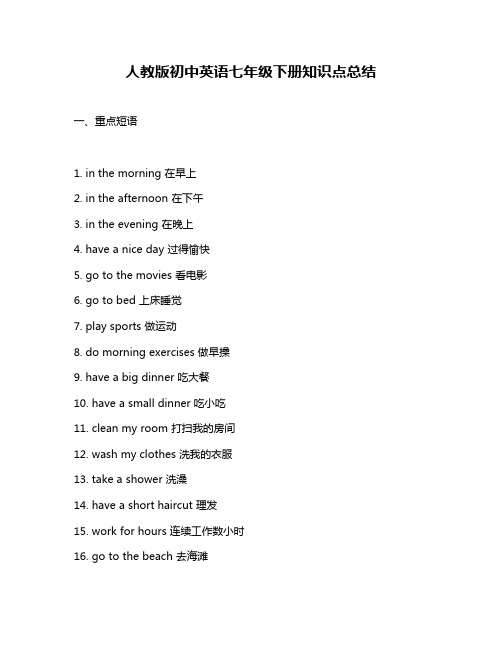
人教版初中英语七年级下册知识点总结一、重点短语1. in the morning 在早上2. in the afternoon 在下午3. in the evening 在晚上4. have a nice day 过得愉快5. go to the movies 看电影6. go to bed 上床睡觉7. play sports 做运动8. do morning exercises 做早操9. have a big dinner 吃大餐10. have a small dinner 吃小吃11. clean my room 打扫我的房间12. wash my clothes 洗我的衣服13. take a shower 洗澡14. have a short haircut 理发15. work for hours 连续工作数小时16. go to the beach 去海滩17. on the weekend 在周末18. listen to music 听音乐19. have a party 举办聚会20. watch TV 看电视21. play computer games 玩电脑游戏22. in the pool 在游泳池里23. go to the zoo 去动物园24. in the mountains 在山里25. have fun 玩得开心26. the great wall 长城27. many places of interest 名胜古迹28. be ready for 为……准备好29. stay healthy 保持健康30. how much 多少31. would you like 一些……吗?32. some noodles 一些面条33. order a pizza 定一个披萨饼34. make a phone order 电话订购35. would you like to do sth 你愿意做某事吗?36. want to do sth 想做某事37. would you like +名词你愿意要……吗?38. would you like +动词不定式你愿意……吗?39. choose some food 选择一些食物40. order the food 订购食物41. be careful 当心;小心42. not much 不多;少量的43. be ready to do sth 准备好做某事。
人教版七年级英语下册各知识点归纳总结
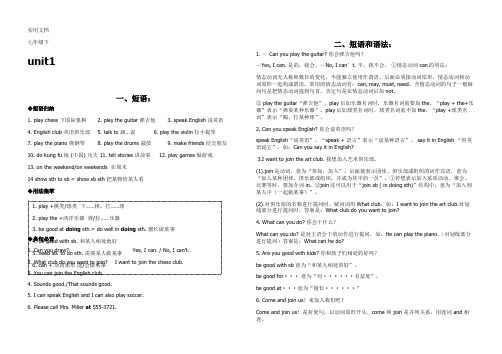
七年级下unit1一、短语:◆短语归纳1. play chess 下国际象棋2. play the guitar 弹吉他3. speak English 说英语4. English club 英语俱乐部5. talk to 跟…说6. play the violin 拉小提琴7. play the piano 弹钢琴8. play the drums 敲鼓9. make friends 结交朋友10. do kung fu 练 (中国) 功夫 11. tell stories 讲故事 12. play games 做游戏13. on the weekend/on weekends 在周末14 show sth to sb = show sb sth 把某物给某人看◆用法集萃◆典句必背1. Can you draw? Yes, I can. / No, I can’t.2. What club do you want to join? I want to join the chess club.3. You can join the English club.4. Sounds good./That sounds good.5. I can speak English and I can also play soccer.6. Please call Mrs. Miller at 555-3721.二、短语和语法:1. — Can you play the guitar? 你会弹吉他吗?—Yes, I can. 是的,我会。
—No, I can’t. 不,我不会。
①情态动词can的用法:情态动词无人称和数目的变化,不能独立使用作谓语,后面必须接动词原形,情态动词和动词原形一起构成谓语。
常用的情态动词有:can, may, must, need。
含情态动词的句子一般疑问句是把情态动词提到句首,否定句是在情态动词后加not。
人教版七年级下册英语语法知识点归纳总结
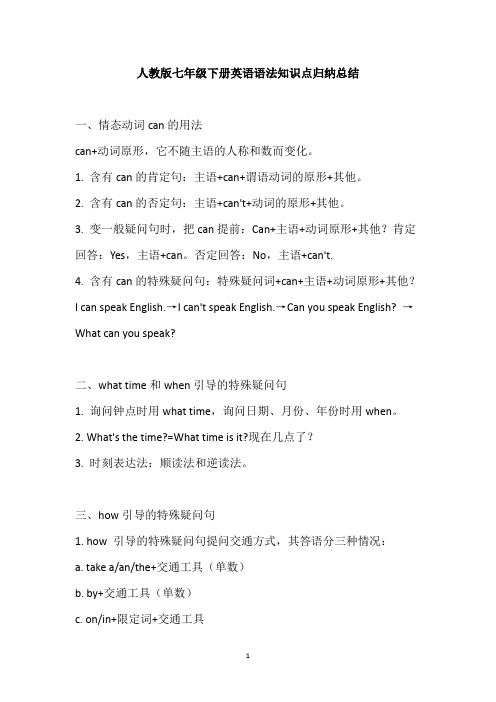
人教版七年级下册英语语法知识点归纳总结一、情态动词can的用法can+动词原形,它不随主语的人称和数而变化。
1. 含有can的肯定句:主语+can+谓语动词的原形+其他。
2. 含有can的否定句:主语+can't+动词的原形+其他。
3. 变一般疑问句时,把can提前:Can+主语+动词原形+其他?肯定回答:Yes,主语+can。
否定回答:No,主语+can't.4. 含有can的特殊疑问句:特殊疑问词+can+主语+动词原形+其他?I can speak English.→I can't speak English.→Can you speak English? →What can you speak?二、what time和when引导的特殊疑问句1. 询问钟点时用what time,询问日期、月份、年份时用when。
2. What's the time?=What time is it?现在几点了?3. 时刻表达法:顺读法和逆读法。
三、how引导的特殊疑问句1. how 引导的特殊疑问句提问交通方式,其答语分三种情况:a. take a/an/the+交通工具(单数)b. by+交通工具(单数)c. on/in+限定词+交通工具---How do you go to school every day?---I take a bus to go to school every day./I go to school by bus every day./I go to school on the bus every day.2. how far 用来提问距离,多远,其答语分为两种:(1)用长度单位表示:It is five kilometers.(2)用时间表示:It’s twenty minutes’walk.3. how long 用来提问时间,意为多久回答常用“for+段时”。
人教版七年级下册英语各单元知识点归纳

5。be good with sb。和某人相处地好be good for有利于
6. can +动词原形能/会做某事[can是照妖镜]
7。a little +不可数名词一点儿……
8。join the…club加入…俱乐部;
9. like to do sth。=love to do sth。=like doing=enjoy doing喜欢/喜爱做某事come to my school
6 No+doing或者No+名词,例如No swimming!No photos!
Unit 5 Why do you like pandas?
◆短语归纳
1. kind of = a little有几分,有点儿,修饰形容词,表示程度
14 want to do想要去做
15 music(音乐)—musician(音乐家)
◆用法集萃
1。play +棋类/球类下……棋,打……球[不戴帽子]
2. play the +乐器弹/拉……乐器[戴帽子]
3. be good at doing sth。= do well in doing sth。擅长做某事
6. It is + adj. + to do sth.做某事是….It是形式主语,不定式是真正的主语
7. Thanks for + n。/ doing感谢你(做)某事。He is like a father to me.【like】是介词,表示“像"8 What do you think of the movie?=How do you like the movie?你认为这部电影总么样?
人教版英语七年级下册课本知识点梳理
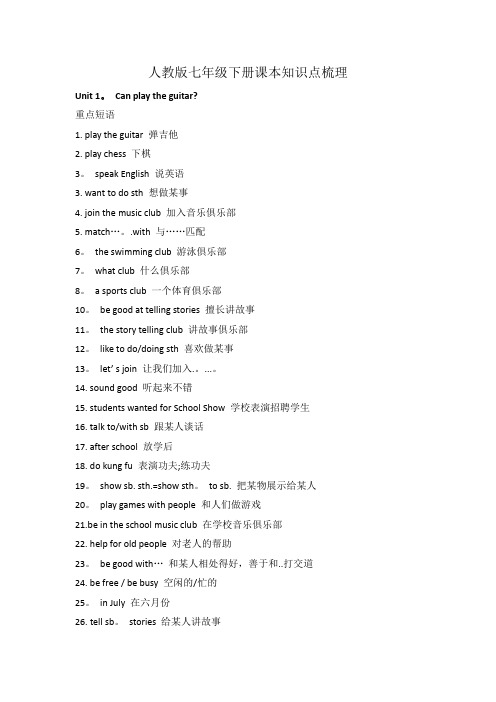
人教版七年级下册课本知识点梳理Unit 1。
Can play the guitar?重点短语1. play the guitar 弹吉他2. play chess 下棋3。
speak English 说英语3. want to do sth 想做某事4. join the music club 加入音乐俱乐部5. match…。
.with 与……匹配6。
the swimming club 游泳俱乐部7。
what club 什么俱乐部8。
a sports club 一个体育俱乐部10。
be good at telling stories 擅长讲故事11。
the story telling club 讲故事俱乐部12。
like to do/doing sth 喜欢做某事13。
let’ s join 让我们加入.。
...。
14. sound good 听起来不错15. students wanted for School Show 学校表演招聘学生16. talk to/with sb 跟某人谈话17. after school 放学后18. do kung fu 表演功夫;练功夫19。
show sb. sth.=show sth。
to sb. 把某物展示给某人20。
play games with people 和人们做游戏21.be in the school music club 在学校音乐俱乐部22. help for old people 对老人的帮助23。
be good with…和某人相处得好,善于和..打交道24. be free / be busy 空闲的/忙的25。
in July 在六月份26. tell sb。
stories 给某人讲故事27。
make friends with…和某人交朋友28。
call sb. at ……给某人打电话……29。
on the weekend 在周末30. help sb.(to)do sth. 帮助某人做某事31. help sb。
人教版七年级英语下册总复习知识点考点总结归纳
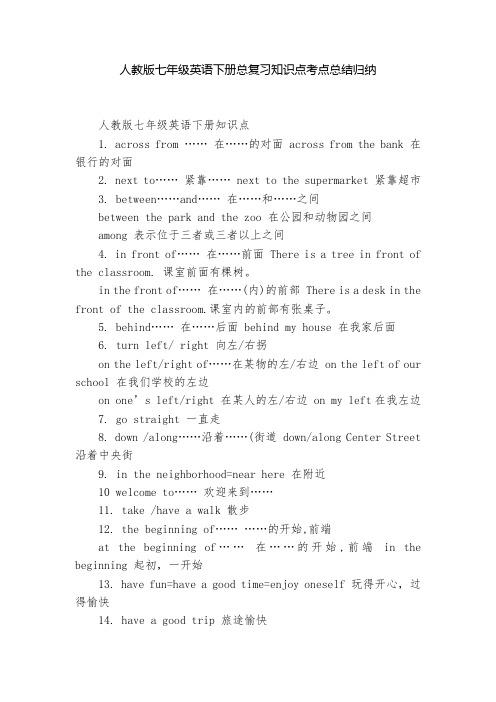
人教版七年级英语下册总复习知识点考点总结归纳人教版七年级英语下册知识点1. across from ……在……的对面 across from the bank 在银行的对面2. next to……紧靠…… next to the supermarket 紧靠超市3. between……and……在……和……之间between the park and the zoo 在公园和动物园之间among 表示位于三者或三者以上之间4. in front of……在……前面 There is a tree in front of the classroom. 课室前面有棵树。
in the front of……在……(内)的前部 There is a desk in the front of the classroom.课室内的前部有张桌子。
5. behind……在……后面 behind my house 在我家后面6. turn left/ right 向左/右拐on the left/right of……在某物的左/右边 on the left of our school 在我们学校的左边on one’s left/right 在某人的左/右边 on my left在我左边7. go straight 一直走8. down /along……沿着……(街道 down/along Center Street 沿着中央街9. in the neighborhood=near here 在附近10 welcome to……欢迎来到……11. take /have a walk 散步12. the beginning of…………的开始,前端at the beginning of……在……的开始,前端in the beginning 起初,一开始13. have fun=have a good time=enjoy oneself 玩得开心,过得愉快14. have a good trip 旅途愉快15. take a taxi 坐出租车16. 到达:get to +地方get here/ there/ home 到这/那/家 arrive in +大地方 I arrive in Beijing. arrive at +小地方I arrive at the bank. reach +地方17.go across 从物体表面横过 go across the street横过马路go through 从空间穿过 go through the forest穿过树林18.on + 街道的名称。
人教版人教版七年级下册英语知识点复习(完整版)
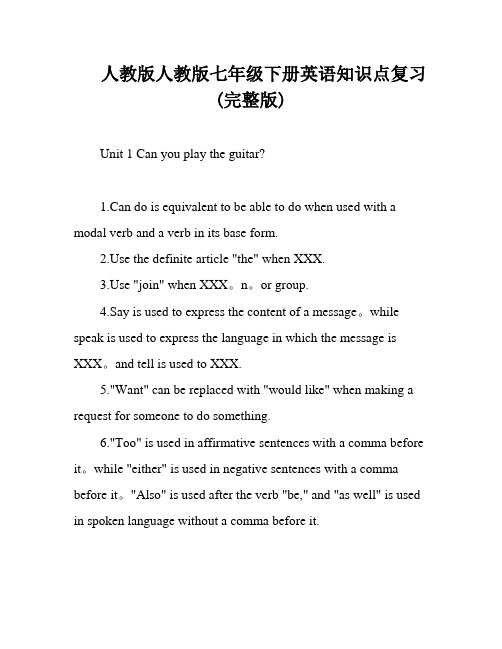
人教版人教版七年级下册英语知识点复习(完整版)Unit 1 Can you play the guitar?1.Can do is equivalent to be able to do when used with a modal verb and a verb in its base form.e the definite article "the" when XXX.e "join" when XXX。
n。
or group.4.Say is used to express the content of a message。
while speak is used to express the language in which the message is XXX。
and tell is used to XXX.5."Want" can be replaced with "would like" when making a request for someone to do something.6."Too" is used in affirmative sentences with a comma before it。
while "either" is used in negative sentences with a comma before it。
"Also" is used after the verb "be," and "as well" is used in spoken language without a comma before it.7."Be good at" is used to XXX or activity。
人教版七年级英语下册单元知识点总结(全册)
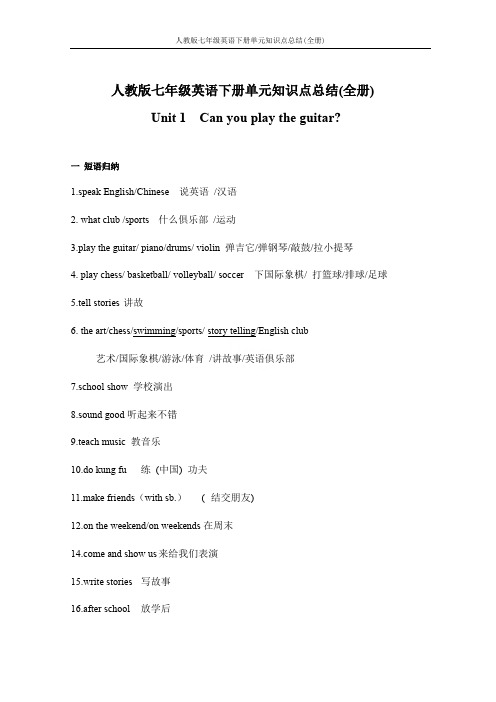
人教版七年级英语下册单元知识点总结(全册)Unit 1 Can you play the guitar?一短语归纳1.speak English/Chinese 说英语/汉语2. what club /sports什么俱乐部/运动3.play the guitar/ piano/drums/ violin 弹吉它/弹钢琴/敲鼓/拉小提琴4. play chess/ basketball/ volleyball/ soccer 下国际象棋/ 打篮球/排球/足球5.tell stories讲故6. the art/chess/swimming/sports/ story telling/English club艺术/国际象棋/游泳/体育/讲故事/英语俱乐部7.school show 学校演出8.sound good听起来不错9.teach music 教音乐10.do kung fu练(中国) 功夫11.make friends(with sb.)(结交朋友)12.on the weekend/on weekends在周末e and show us来给我们表演15.write stories写故事16.after school放学后17.English-speaking students说英语的学生18.play games 做游戏19.the Students’ Sports Center学生运动中心20.at the old people’s home在老人之家21.be in our school music festival 参加学校音乐节22.jion the music club加入音乐俱乐部二用法集萃1. play +棋类/球类下……棋,打……球2. play the +乐器弹/拉……乐器3. be good at doing sth.擅长做某事be good for.. 对… 有好处be good /kind to … 对… 友好4. be good with sb. 和某人相处地好; 善于应付(处理)…5. need(sb./sth.)to do… 需要(某人/某物)做….6. can + 动词原形能/会做某事7. a little + 不可数名词: 一点儿……9. like to do sth.或like doing sth. 喜欢做某事10.want to do…想做……11.What about…?…怎么样?(后面接Ving/代词/名词)12. talk用法: talk to/with sb. 跟某人说话talk about sth. 谈论某事tell 用法:tell sb sth. 告诉某人某事tell sb to do sth 告诉某人去做某事tell stories 讲故事say用法:say直接加说话的内容/itspeak用法:speak +语言13.help sb. with sth在某方面帮助某人= help sb.(to)do sth14.be free /busy有空/很忙15. call sb. at+号码拨打某人的……号码16. be in=join …成为…中的一员(P6)17.want …for the school show为学校表演招聘……三典句必背1. Can you draw? 你会画画吗?Yes, I can. / No, I can’t.是,我会。
- 1、下载文档前请自行甄别文档内容的完整性,平台不提供额外的编辑、内容补充、找答案等附加服务。
- 2、"仅部分预览"的文档,不可在线预览部分如存在完整性等问题,可反馈申请退款(可完整预览的文档不适用该条件!)。
- 3、如文档侵犯您的权益,请联系客服反馈,我们会尽快为您处理(人工客服工作时间:9:00-18:30)。
③Ihaveabrother.我有一个弟弟。
肯定句变成否定句需要用助动词don't/doesn't,即由“主语+don't/doesn't+have+其他”构成。
(do not=don't,does not=doesn't)以上三句的否定句依次为:①Shedoesn't have anewpen.她没有一枝新钢笔。
②They don't have lunchathome.他们不在家吃午饭。
③I don't have abrother.我没有一个弟弟。
肯定句变成一般疑问句需要用助动词do/does,即一般疑问句为“Do/Does+主语+have+其他”。
所以以上三句的一般疑问句形式依次为:① Does shehave anewpen她有一枝新钢笔吗? Yes,she does./No,she doesn't.②Do they have lun at home?他们在家吃午饭吗?Yes,theydo./No,theydon't.③Do you haveabrother?你有一个弟弟吗?Yes,Ido./No,Idon't.(.3.)实义动词....)的一般现在时.....(表示人或动物动作的动词即行为动词肯定句由“主语+动词原形(s/es)”构成。
(注意:只有在主语为第三人称单数的情况下,动词原形后面才加s/es)。
例如:①I do homework every day.我每天都做作业。
②He watches.. TV every evening.他每晚都看电视。
肯定句变成否定句需要用助动词don't/doesn't,即由“主语+don't/doesn't+动词原形”构成。
以上三句的否定句依次为:①I don't do homework every day.我每天不做作业。
②He doesn't watch TV every evening.他每晚不看电视。
肯定句变成一般疑问句需要用助动词do/does,即一般疑问句为“Do/Does +主语+动词原形”。
所以以上三句的一般疑问句形式依次为:①Do you do homework every day?你每天都做作业吗?Yes,Ido./No,Idon't.②Does he watch TV every evening?他每晚都看电视吗?Yes,shedoes.No,shedoesn't.七年级英语下册第一单元Unit 1 Where is your pal from?国家与语言(熟悉内容):China – Chinese (汉语,中国人) England – English Canada – Canadian (加拿大人) France – French (法语,法国人)America – American (美国人)Japan – Japanese (日语,日本人)Australia – Australian (澳大利亚人)(p1)be from =come from 来自Linda is from Japan.= Linda comes.from Japan.那么Where'syour pen pal from?= ?(p2)live住,居住(后跟地点是常用live in) 。
例如:I live in China. Do you live in China? Yes,Ido.No,Idon't.I don'tlive in China.Where do you live? (where 是副词,和动词live搭配时,动词后不能加介词in)His aunt lives in Sydney.Does his aunt live in Sydney?Yes,shedoes.No,shedoesn't .His aunt doesn't live in Sydney. Where does His aunt live?(p3)说某种语言用speak, speak Chinese/ English/ Japanese /French说汉语/英语/日语/法语问某人说某种语言用句型What language do/does sb speak?What language do you speak?I speak Chinese.What language does Mary speak?She speaks English.(p5,3a)14 years old 14岁解释:数字+ year(s) old …岁当数字大于1时,year用复数years。
I am 30 years old. Her son is 1 year old.(p5,3a)can为情态动词,“能,能够,会”。
后面跟动词时必须用动词原形。
肯定句变成一般疑问句需把can提到句首。
肯定句变成否定句只需把can变成can't 既可。
例如:She can speak English. Can she speak English? Yes,she can.No,she can't .She can't speak English.(p5,3a)“Like+动词ing”表示“喜欢做某事”I like playing basketball.Tom likes listening to music.注意:“Like+to+动词”也表示“喜欢做某事”,只是“Like+动词ing”表示习惯性动作(也可以说是爱好),而“Like+to+动词”表示一次性或短暂性的。
OurPEteacherlikesswimming.( 表示爱好) He likes playing basketball,but today he doesn't like to play basketball.他爱好打篮球(爱好),但是今天他没去打篮球(短暂性的)。
(p5,3a)Write to 人:写信给某人He often Writes to his mother. Do you often Write to your pen pal? (p5,3b)on weekens在周末(p5,3b) favorite形容词“最喜爱的”,名词“最喜爱的人或物”。
My favorite sport is soccer.我最喜爱的运动是足球。
Hammbugersaremyfavorite.是我最喜爱的食物。
(p5,3b)tellsb.aboutsth告诉某人某事Mymotheroftentellsmeaboutmygrandfather.我的妈妈经常告诉我关于我爷爷的事。
第二单元Unit 2 Where’s the post office?(p7-8)“There be结构的一般现在时基本句型如下:肯定句:①There is(There's) a big supermarket near my home.(可数名词单数)在我家附近有一个大超市。
②There is(There's) some water in the glass.(不可数名词)在玻璃杯里有一些水。
③There are 30 students in the classroom.(可数名词复数)在教室里有30个学生。
否定句There be结构的否定句只需在肯定句中be的后面加not即可。
(is not =isn't,are not=aren't)。
因此以上三句的否定句依次为:①There isn't a big supermarket near my home.名词单在我家附近没有大超市。
②There isn't any water in the glass.在玻璃杯里没有水。
(肯定句中的some,在疑问句和否定句中需要变成any)③There aren't 30 students in the classroom.在教室里没有30个学生。
疑问式和简略答语一般疑问句:只需把肯定句中的be提到句首即可。
因此以上三句的一般疑问句依次为:①Is there a big supermarket near your home?Yes,there is. No,there isn't.在我家附近有一个大超市吗?②Is there any water in the glass?Yes,there is. No,there isn't.在玻璃杯里有一些水吗?③Are there 30 students in the classroom?在教室里有30名学生吗?Yes,there are. No,there aren't.特殊疑问句:How many days are there in a week?一个星期有多少天?There are seven.有七天。
注:在There be结构的一般现在时基本句型中,若“某物/某人”为好几个并列,往往根据第一个人/物的单复数来确定be 的形式。
比较以下两句的差异:There is a pen and two books on the desk.There are two books and a pen on the desk.(p8)方位词的用法:①next to在…旁边,②between…and…在…和…之间③across from在…对面,④behind 在…的后面,⑤in the neighborhood在附近,⑥in the front of在(物体里面的)前面,in front of在(物体外面的)前面,⑦on在…街上①The library is next to the bank. ②The library is between the restaurant and the bank.③The bank is across from the restaurant. ④The park is behind the bank.⑤There is a payphone in the neighborhood. ⑥There is a blackboard in the front of classroom.在教室的前面有一块黑板。
(黑板在教室的里面)There is a big tree in front of classroom. 在教室的前面有一棵大树。
(大树在教室的外面)⑦The library is on YiMeng Street.(p9)go straight一着往前走,turn left/right向左/右拐,on the left/right在左边/右边(p10,1a)形容词反意词:clean—dirty;new—old;big—small(p11,3a)the garden district 花园小区;take a walk 散步;the beginning of…的开始Do you like the beginning of the movie?你喜欢这步电影的开头吗?(p11,3a)enjoy喜欢,过得快乐(后面跟的动词必须加ing)I enjoy the movie我喜欢这步电影。
